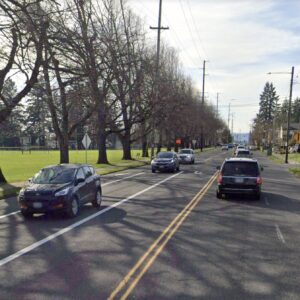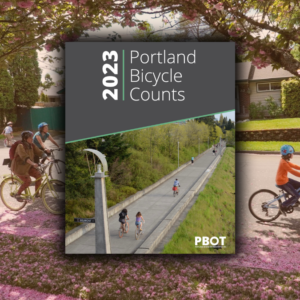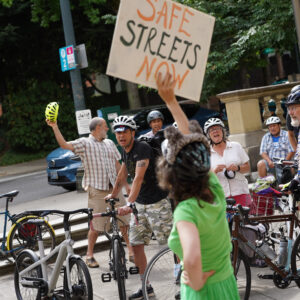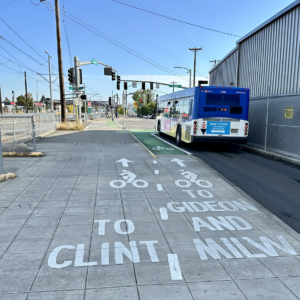CITY OF PORTLAND OFFICE OF TRANSPORTATION
PRESS RELEASE
For Immediate Release
October 26, 2007
Contact: Cheryl E. Kuck at (503) 823-5552
Or: Tom Miller at (503) 823-1121
Committee on Policy, Engineering, and Enforcement for Bicycle Safety Develops Action Plan to Improve Bicycle Safety in Portland
(PORTLAND, OR) – Representatives from Portland’s bicycle and freight communities, safety advocates, traffic engineers, Police, Multnomah County, and other stakeholders met Friday, October 26, to discuss a bicycle safety action plan developed by Commissioner Adams and the Portland Office of Transportation. Commissioner Adams formed the Committee on Policy, Engineering, and Enforcement for Bicycle Safety in response to the recent bicycle fatalities in Portland.
The Committee convened at City Hall to discuss solutions to Portland’s bicycle safety problems – with particular emphasis on bicycles and trucks – and to develop both a short term and a long term safety action plan. The Committee discussed potential engineering, enforcement, and education measures.
So far in 2007, Portland has seen six bicycle fatalities – the highest number of bicycle fatalities on record for one year. Two of them involved a cyclist and a large truck. On October 22, a cyclist collided with a garbage truck on N. Interstate as the truck was making a right turn onto Greeley. On October 11, a cyclist was run over by a cement truck on SW 14th Avenue as the truck was turning right at Burnside. By contrast, in 2006 Portland had zero bicycle fatalities and 203 reported bicycle crashes. Reported crashes for 2007 will not be received until next year from the Oregon Department of Transportation.
“Despite this year’s surprising and alarming fatalities, bicycling in Portland has become safer,” says Commissioner Adams. “With reported crashes increasing only slightly and ridership increasing exponentially, our bicycle crash rate is decreasing.”
Even with that good news, however, Commissioner Adams recognizes the public’s concern about bicycle safety. “Studies show that over half of Portland residents limit their bicycling due to traffic safety concerns. Obsolete designs and increasing traffic have contributed to a system that is unsafe. The type of crashes that occurred in the past two weeks should never happen in a city with a well-integrated focus on promoting increased bicycling.”
The Committee’s short-term plan is to identify problem intersections that have conflicts between bicyclists and motorists making right turns. That part is easy, as 100 such difficult intersections have already been identified by participants at the June 2006 Portland Bike Safety Summit, by the Portland Bicycle Advisory Committee, and by City staff.
Potential infrastructure solutions
* Treating 14 of the city’s top difficult intersections, which will include N. Interstate at Greeley and SW 14th Avenue at Burnside, with a “bike box” to reduce bicycle crashes referred to as a left and right “hook”
* Bike box at stop bar at intersection
1 Skip-stripes, with or without color, through intersection with bike box
2 Widen bike lane at intersection
3 Bike warning sign activated by bike loop
4 No right turn on red lights with bike boxes
Potential equipment solutions
Equipping trucks with mirrors to eliminate blind spots
Equipping trucks with side guards to prevent people from being pulled under the vehicle
Equipping bicycles with mirrors and noisemakers
Potential enforcement and crash investigation solutions
Police enforcement and crash investigation policies
Jail time for drivers with suspended licenses
Potential education solutions
Department of Motor Vehicles supplemental urban driver’s guide and testing
Enhanced truck driver education for urban truck drivers
Enhancements to existing programs like Share the Road, See and Bee Seen (Light the bike, see the bike), and I Brake for People
Commissioner Adams stressed the need for everyone to “share the road and practice safe travel behaviors whether you’re driving, biking, walking, taking transit, or using some other mode to get around Portland.”
Commissioner Adams reported that toward promoting the safety of Portland citizens and its City workers, the City of Portland has installed many safety devices in its heavy equipment fleet. These include additional mirrors, side signal lights, backup cameras, reflective tape, and frenzel-optical lenses that allow drivers to see through the passenger-side door. These safety items, combined with extensive operator training, significantly improve safety for pedestrians, bicyclists, other vehicle operators, and City workers.
The City has also reviewed its dump trucks, street sweepers, aerial tower trucks, boom trucks, vacuum trucks, and equipment trailers to determine if a side guard retrofit would keep a person from getting in front of the rear wheels. Fortunately, most of the City’s equipment already includes a side protection between the axles. The protection comes from the tool bins mounted to the body or frame of the truck, or, in some cases, the space between the axles is filled with a fuel tank and tool bins.
An assessment of the fleet made this morning, Friday, October 26, shows that about 12 pieces of equipment could benefit from the installation of the side guards. The cost is about $4,500 per side, and includes design, fabrication, installation, and wiring of the new lights. Adding one side guard to each of these 12 pieces of equipment would cost the City approximately $54,000.
Commissioner Adams emphasized that his “Safe, Sound and Green Streets” initiative is one solution to the growing backlog of maintenance and safety projects that make Portland’s transportation system unsafe for all users. “With a growing population,” says Commissioner Adams, “there is more demand being placed on the transportation system. Deferred maintenance adds an estimated $9 million annually to the $425 million transportation backlog that exists. Too many Portlanders are being injured and killed on those roads.”
Given the current transportation funding situation, the money does not exist to adequately address these issues. In order to cover the funding gap, it would take a seventeen-cent increase in statewide gas taxes, which is unlikely to happen in the immediate future. Oregon’s last gas tax increase occurred in 1993 and the Portland metro region receives only forty-six-cents out of each dollar paid through gas taxes and vehicle registration fees. Additionally, there are no allocated local funding sources for basic maintenance.
Two more Town Hall meetings are scheduled in Portland to provide residents an opportunity to review the proposal developed in collaboration with the “Safe, Sound and Green Streets” Stakeholder Committee, discuss proposed projects that address safety, paving, and bridge needs, and learn about a possible local funding package to deliver the projects.
Southwest Portland Town Hall
Monday, October 29, 7-9 pm
Wilson High School
1151 SW Vermont
Southeast Portland Town Hall
Tuesday, October 30, 7-9 pm
Sellwood Middle School
8300 SE 15th Avenue
All Portland residents are invited and encouraged to attend these discussions with Commissioner Adams and Multnomah County Chair Ted Wheeler.
For more information and to provide input about the effort underway to develop a bicycle safety action plan, visit www.commissionersam.com. For information on the Safe, Sound and Green Streets proposal, visit www.safeandsoundstreets.com.
###
Cheryl E. Kuck







Thanks for reading.
BikePortland has served this community with independent community journalism since 2005. We rely on subscriptions from readers like you to survive. Your financial support is vital in keeping this valuable resource alive and well.
Please subscribe today to strengthen and expand our work.
Someone else made the point that nothing creates change like holding people accountable financially. While the issues being discussed are larger than one accident involving death, there is something to be said for the fact that the driver of the vehicle was anything but a \”professional\” driver. 25 infractions over his career? The company that hired him is complicit in Brett\’s death…
A civil suit brought against the garbage company, for negligence might start to send the message through the legal system that poor driving will NOT be tolerated. Even if the driver is not criminally liable, he is civilly liable.
If we did a a full-court fund raising press to help Brett\’s next of kin level a civil suit against the driver and the garbage company, and extract a big judgment from the garbage company, and maybe even a demand that punitive damages be paid to local advocacy groups, THAT would get anybody who hires a \”professional\” driver to take notice.
As for your average Joe or Joanna car commuter, well… I\’m still working on that one.